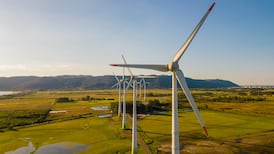City appeal
Cork City is on the ascendancy! Figuratively — and due to national development plans, a swish news skyline and buzzing new rooftop restaurants like The Dean — literally, too. Ireland’s third city with its walkable island centre offers its locals friendly small village feels with a long-established cosmopolitan edge. From eating Babagannoush at Izz’s Palestinian café, enjoying brunch at vibey Goldberg’s in Cork’s former Jewish quarter to finding your zen in the urban oasis of the Nano Nagle Centre, the city is cultural mix. You’ll find an eclectic gathering of attractions and a fun calendar or events in the city too, from Crawford Gallery to quirky cultural happenings like (yes, it’s back..,), the Cork Midsummer Festival.
Car-free freedom
While negotiating the Dunkettle and the Kinsale Road Roundabout on a sun-drenched evening gives commuters a L.A. traffic, you won’t need a car in the city to survive. The city is served by a great bus service which serpentines its way across the hills and troughs or the city’s recently extended boundaries while there is also a popular shared-bike scheme (aka Coca Cola Zero bikes) for those who wish to zip around on two wheels. For car free excursions, take the train for a morning of island-hopping, East Cork style. Start at Fota Island where historic Fota House and Gardens are a tranquil 15 minute walk from the station; hop on the train to Great Island (aka Cobh) where you can visit the Titanic Experience or Cobh Heritage Centre before taking the afternoon ferry to Spike. The island is home to a rich history from its maritime standing to its more recent period as a prison – all in a scenic natural setting.
Food revolution
While Corkonians may be slow to toot their own humility horn, when it comes to food, they justifiably deserve some bragging rights nationally and globally. The county may be famed for its specialties (think tripe, drisheen and Murphys) but the Cork culinary menu extends far beyond them. Thanks to pioneers like Ballymaloe and Longueville House, the county has been at the forefront of Ireland’s slow food movement since the 70’s and there is a culture of sustainable, farm-to-fork or pier-to-plate food by default, rather than by design. Kinsale, a short spin from Cork City has established itself as the seafood dining Shangri-la of Ireland; in East Cork, Midleton and its hinterland are a hub of fantastic eateries from Ferritt & Lee to newly opened Sea Church in Ballycotton.
Great outdoors
Lover of the great outdoors? Cork makes a fantastic escape for some pure alfresco adventure, whatever your energy levels. Beyond the city’s patchwork of greenspaces like Fitzgerald’s Park and UCC campus, you’ll find endless walking, hiking and biking trails in the county. East Cork features some fantastic cliff walks from Ballycotton to Knockadoon while in West Cork, hillier climes like the Shehy and Caha Mountains really up the adventure ante. Don’t overlook unspoiled North Cork either. If you prefer adventures on two wheels, the Ballyhoura region of North Cork (with a crossover shout out to neighbouring Limerick) offers some of the best mountain-biking trails in the county, while Doneraile Estate near Mallow, which its heritage manor and resident herd of deer, makes a great spot to wander for both history and nature buffs.
Pure nature
As Ireland’s largest county, Cork features a wealth of natural beauty and biodiversity. On the West Cork coast, you’ll find reputable whale-watching outfitters which offer sightseeing tours of our wildlife rich coast. Expect to discover anything from humpback, fin and minke whales to pods of dolphins and porpoise. You may well spot some marine life on a coastal walk – keep an eye out for colossal basking sharks feeding in early summer. In the Glengarriff and Bantry region, you’ll find a number of seal colonies; you can also take a sea safari of the bays here – keep an eye out for Ireland’s successfully reintroduced white-tailed eagles who have made their home in the region in recent years.
Coastal escape
Cork has 1000km of coastline (longer than Poland or Jamaica!) which offer endless coasteering potential. In fact, take a road from Youghal to Bantry and you’d be forgiven for feeling you’ve crossed a couple of time zones. With stunning beaches like Barleycove, Inchydoney and Long Strand, the county hosts a trove of quirky, coastal attractions. For inspiration, imagine yourself embarking on an island tour of Ballycotton Lighthouse, going to a Buddhist meditation retreat at Dzogchen Beara in West Cork, or a moonlit kayaking session on Lough Hyne. While you’re creating that coastal bucket-list, why not pencil in a trip to Dursey Island, reachable via Europe’s only cross-sea cable car.
Gaeltacht culture
Cork, with its two surviving Gaeltacht regions, makes for excellent culture escape. Being an island (Ireland’s southernmost community in fact) Cape Clear (or Oíleán Chléire to its locals) offers bonus gallivanting points. A short spin and ferry ride from Baltimore and you’ll be transported to another world of native Munster Irish speakers. To stay on the mainland, pay a visit to the Muskerry Gaeltacht, which covers a rolling rural expanse across the villages of Ballyvourney, Ballingeary and Cúil Aodha. Be sure to pay a visit to one of the region’s (and the county’s) most scenic spots: Gougane Barra which features a stunning forest park and postcard lakeside chapel. Go n-éirí an bóthar libh!









